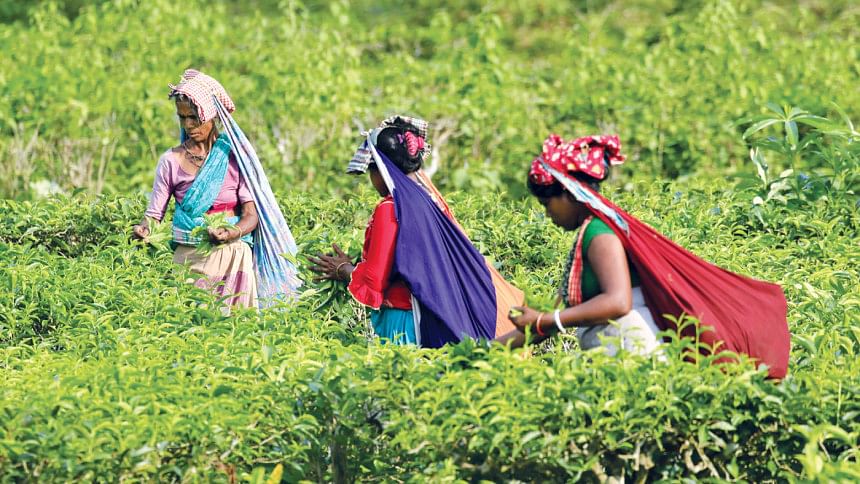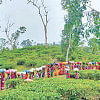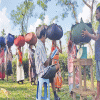Tea industry needs climate-adaptive varieties: experts

Bangladesh Tea Research Institute (BTRI) alongside universities need to conduct advanced scientific research to come up with tea plant varieties that can adapt to climate change while providing quality and high yields, suggested speakers at a seminar yesterday.
Commonwealth Journalists Association Bangladesh organised the seminar, styled "The State of Tea Industry in Bangladesh: Challenges and Prospects", at Sylhet Agricultural University.
In Bangladesh, 1,740 kilogrammes (kg) of tea can be produced on an average from each hectare of land, said Prof AFM Saiful Islam of the Department of Crop Botany and Tea Production Technology of Sylhet Agricultural University.
The output is 2,500 kg in India and 3,300 kg in Sri Lanka, he said in a keynote speech.
Three quarters of the tea trees in the gardens of Bangladesh are decades-old varieties, for which these produce a low volume of tea leaves, he said.
Besides, droughts lead to a 21 percent to 32 percent reduction in tea production while pest infestation leads to a drop in output of 25 percent to 30 percent annually, said Islam.
Three quarters of the tea trees in the gardens of Bangladesh are decades-old varieties, for which these produce a low volume of tea leaves, said an expert
In 1990, 45.03 million kg of tea were produced, 19.21 million kg consumed locally while 25.40 million kg exported, he said.
Last year, 102 million kg were produced while local demand stood at 95 million kg and only 1.04 million kg were exported, he added.
Sylhet Agricultural University has established a germplasm centre for tea and developed four sustainable tea plant varieties which are awaiting trials before they are offered for commercial introduction, said Islam.
The BTRI, the only state-run research centre for tea in Bangladesh, has developed 23 varieties of tea plants, he said.
The BT2 is the most popular, while the other varieties have not been able to spark that much of an interest from the cultivators, he said.
The professor urged the government for allocating more funds and manpower for the BTRI and establishment of research facilities specialising in genetical engineering for enhancing the quality of tea.
Climate change has been having an adverse impact on tea production, said AKM Rafiqul Hoque, director of the Project Development Unit of Bangladesh Tea Board.
Tea cultivation is suitable within a temperature range of 18°C to 32°C, he said.
However, the climate in regions where tea gardens are situated are experiencing higher temperatures, resulting in droughts and an increase in pest infestations which ultimately affect tea cultivation, he said.
Prices of fertilisers, a labour crisis, disputes over land, disruptions to power and gas supplies, a lack of availability of bank loans, outdated machinery and disputes over auctions are also affecting the industry, added Hoque.
He also urged the government to take up initiatives to counter the adverse effects of climate change, along with ensuring artificial irrigation and new climate change-adaptive varieties and training for cultivators.
A technological hub should be established in Sylhet through a collaborative approach of all stakeholders of the industry, said the seminar's chief guest, Prof Md Alimul Islam, vice chancellor of Sylhet Agricultural University.
In this place, scientists and researchers can showcase their innovations and the growers can decide on availing innovative solutions, he said.
Many stakeholders of the industry are engaged in unethical practices which need to be stopped to ensure quality production to increase exports, said Maj Gen Sheikh Md Sarwar Hossain, chairman of Bangladesh Tea Board, as the guest of honour.
"We should also break the trend of adhering to the traditional auction method to ensure good prices, while the cultivators should come out of the mindset of prioritising quantity over quality," he said.
Parveen F Chowdhury, president of Commonwealth Journalists Association Bangladesh, presided over the event.
Osman Gani Mansur, general secretary of the association, moderated the seminar while Julhas Alam, a member of the association, gave the vote of thanks.

 For all latest news, follow The Daily Star's Google News channel.
For all latest news, follow The Daily Star's Google News channel. 










Comments